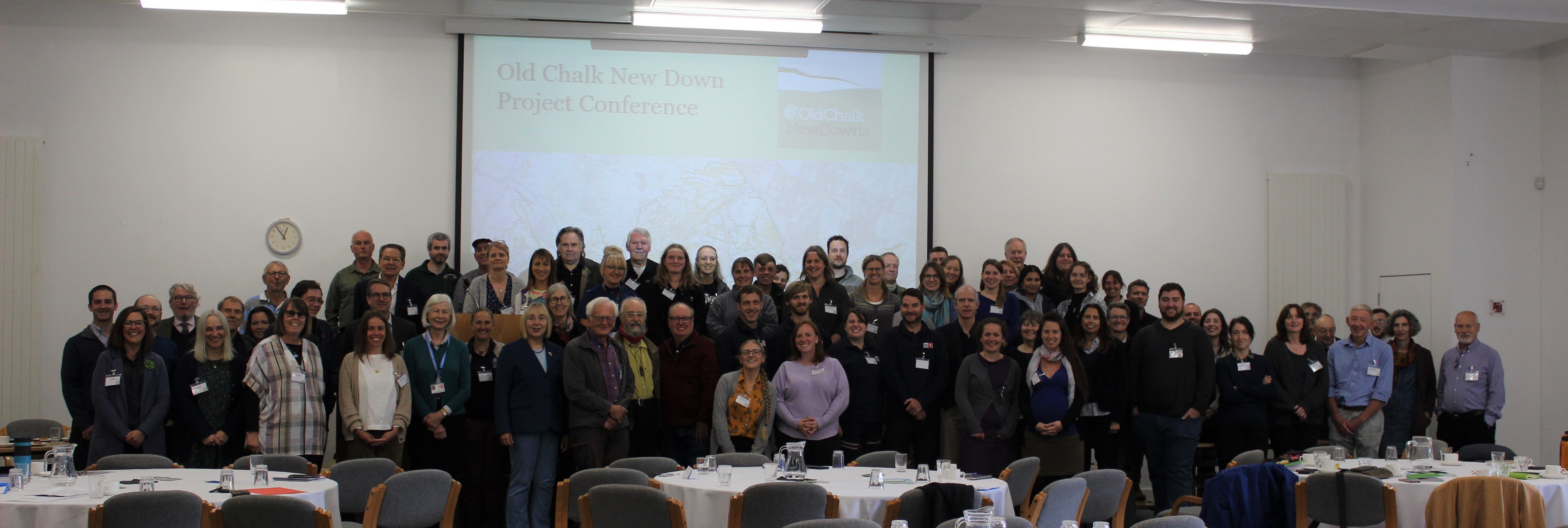
Old Chalk New Downs Project Conference
OCND Project Conference - Reflections from the Day
The Old Chalk New Downs (OCND) project conference was a resounding success, thanks to the support from the National Lottery Heritage Fund, the engaging speakers, enthusiasm of all that attended and the contributions from the OCND community throughout the project.
Opened by Kent County Council Cabinet Member for Environment Susan Carey, the scene was set with the history of the project, its importance to chalk downland conservation and how landscape scale projects can have far reaching positive impacts to the environment and communities.
Split into four sections, we began with an overview of the project’s capital works from OCND Project Manager Jenny Price. Jenny highlighted the importance of appropriate management for chalk grassland and showed that conservation can sometimes look harsh, due to robust intervention measures needed to start restoration. In conservation we must often look at the long-term goals to see the flowers through the mud.
The morning continued with overviews of site restoration works, and we learned that early interventions across many Kent Wildlife Trust sites has had benefits to the species biodiversity, including the reintroduction at one site of dwarf milkwort, a nationally rare species which is now flourishing, and seeds have begun to be collected to continue its reintroduction elsewhere.
We also saw the results of the projects’ chalk grassland condition assessment and hedgerow survey works, highlighting the importance of data collection to indicate the success of restoration works and to inform future management programmes.
The second section of the day focused on engagement, specifically through the OCND education programmes. Starting with an overview from Lyndsay Wayman-Rook the OCND Project Officer, we learned that many challenges were faced when attempting to engage with schools and students. Adapting the project’s engagement plans, and working closely with delivery partners, the project managed to overcome these challenges and exceed outcome expectations. With an original target of 80 primary workshops across 5 schools, the eventual delivery has been 150 primary level workshops delivered to 22 schools.
We continued with an insightful look at the school workshops from a delivery perspective, understanding the importance of making the learner feel comfortable in an outdoor setting to maximise their enjoyment and learning experience.
Students and trainees then took centre stage and told us about their personal experiences with the project and how financial and educational support has enabled them to build skills to further their careers.
After lunch we were joined by several speakers for a panel discussion on conservation, grazing, and management. The panel discussed the challenges faced when managing chalk grassland through conservation grazing, and the need for nature conservation efforts to be financially viable. The link between environment and heritage was a key theme and the panel agreed it is one of the aspects that makes chalk grassland so unique.
The day was rounded off with stories shared by some of the OCND community grant recipients and volunteers. We saw the real impact of the projects’ work to individuals and local communities. Creating access to previously undermanaged sites and giving individuals the skills, confidence and contacts needed for long term management. We heard how learning more about downland habitats and species made individuals feel more connected to their surroundings and that walking through the countryside, Ramblers can appreciate the flowers and small details, not just the beautiful views.
To close the day, Matthew Balfour, Chair of Kent Nature Partnership, shared our thanks to all of those in attendance and spoke of the evident legacy shown through the engagement of the individuals and organisations who have contributed throughout the project.
While the conference signifies the end of the Old Chalk New Downs project approaching, it also showed that its legacy will be carried forward. The OCND team would like to thank everyone that has contributed to the project and helped to make it such a success.
We would like to say a thank you to the speakers for their time and contributions and a special thank you to everyone that helped on the lead up to, and on the day.
List of Speakers
Susan Carey –Kent County Council Cabinet Member for Environment
Alison Ruyter – Kent Wildlife Trust
Rachael Thornley – University of Reading
Matt Davies – Maplango
Kathryn Barton – Medway Valley Countryside Partnership
Alli Clarke – Greenwich University
Jackie Williams – Greenwich University
Hannah Simmons – Kent County Council
Elizabeth Milne – Kent County Council
Guy Nevil – Birling Estate
Sean Gufferty – Surrey County Council Downlands Partnership
Phill Williams – Natural England
Derek Kent – Medway Ramblers
Mike Adams – West Kent Downs Countryside Trust
Susie Simmons - Landowner
Bob Ulph – Leybourne Parish Council
Matthew Balfour – Chair of the Kent Nature Partnership
With thanks to
Jacqui Taylor – Kent County Council
Kirsty Foreman, Kent County Council
Reece Evans – North West Kent Countryside Partnership

 Sweet flower! Of all that bloom by hill or glen Through smiling Kent, there’s none I love like thee For thour’st the truest type of true born men
Hardy unbought, untamable and free...”
Sweet flower! Of all that bloom by hill or glen Through smiling Kent, there’s none I love like thee For thour’st the truest type of true born men
Hardy unbought, untamable and free...”